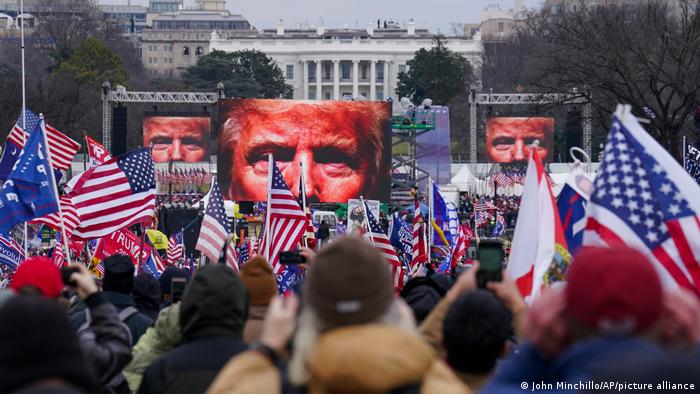
The second of a series of Congressional hearings on Monday focused on the effort of former US President Donald Trump and his closest advisors to overturn the 2020 election.
Former US Attorney General Bill Barr described Trump as "detached from reality," as several former close aides and government officials spoke about his efforts.
Monday's hearing focused primarily on how Trump ignored and then sidelined aides who informed him correctly that the 2020 election was lost and Joe Biden had won.
In addition to Barr, several of those closest to him testified before the January 6 Committee, including Trump campaign manager Bill Stepien, son-in-law and top aide Jared Kushner and Justice Department official Richard Donoghue.
They all described Trump as clinging to outlandish theories pointing to victory rather than concede defeat. Each witness spoke of a parallel effort led by former New York City Mayor and US Attorney Rudy Giuliani to push conspiracy theories and baseless claims of voter fraud.
What did the January 6 Committee's witnesses say?
Stepien, who was scheduled to appear but had to bow out at the last moment due to his wife going into labor, described Trump in a videotaped deposition played by the January 6 Committee investigating the Capitol riot as "growing increasingly unhappy" on election night.
In a separate videotaped deposition played by the committee, Kushner told investigators he attempted to steer his father-in-law away from Rudy Giuliani and the increasingly wild conspiracy theories hinging on baseless claims of voter fraud he pushed.
In her introduction on Monday, Rep. Liz Cheney, a Republican of Wyoming and the daughter of the former vice-president, described Giuliani as "apparently inebriated" on election night when he encouraged Trump to declare victory preemptively. That description had been provided by Stepien, Kushner and top Trump aide Jason Miller.
Miller told the committee in his videotaped deposition, "The mayor was definitely intoxicated but I, um, did not know his level of intoxication when he spoke with the president, for example."
Donoghue, the former Justice Department official, said he refuted numerous claims of electoral fraud pushed by Giuliani and several others ranging from a truck full of ballots in Pennsylvania to a "suspicious suitcase" of ballots in Georgia as "false."
Barr was most candid, at once point laughing about a false claim being pushed by those closed to Trump as "bogus" and "idiotic."
"There was never an indication of interest in what the actual facts were," Barr said. He added, "I didn't want to be a part of it."
Barr resigned nearly six weeks after election day on December 14, 2020 over Trump's efforts to see the election overturned.
What else did Monday's hearing reveal?
The January 6 committee described the massive fundraising effort that took place to collect money to overturn the election in the aftermath of Trump's apparent defeat.
Rep. Zoe Lofgren, a Democrat from California, noted Trump raised $250 million (€240 million) as part of the effort to keep fighting the reality of his loss, calling it "the big rip-off."
Both Stepien and Miller also described how quickly the mood changed at the White House after Fox News was first to call the state of Arizona for Joe Biden.
Stepien said his advice, "to say that votes were still being counted, it's too early to tell, too early to call the race," was ignored as Trump plowed ahead with declaring victory. Later, Trump claimed the election was stolen when his initial statements were rendered false by the election outcome.
Stepien described his efforts and those who relayed similar messages to Trump as "team normal."
Chris Stirewalt, a former Fox News Channel political editor who called Arizona for Biden on election night, was among those who testified in person. Additionally, former U.S. attorney in Atlanta, BJay Pak, testified how he resigned rather than be fired as Georgia state officials came under pressure to find votes for Trump that did not exist.
Noted Republican election lawyer Benjamin Ginsberg described normal election campaign challenges, and Al Schmidt, the former Philadelphia City Commissioner, also appeared in person.
What is the January 6 committee investigating?
The House committee is focused on what has come to be known as "the big lie," namely claims made by Trump and promulgated by several of his aides and supporters that the 2020 election was stolen.
Trump's baseless claims of voter fraud riled up his supporters and fueled an attempted insurrection in the form of a violent riot on Capitol Hill. Nine people died on that day and in the days and weeks after, including several law enforcement officers who died by suicide in the aftermath of the insurrection.
The Capitol riot took place on January 6, 2021, the day the 2020 election was certified by Congress and Vice-President Mike Pence. In an earlier hearing, the first to be held last week, the riot was described as a coup attempt.
In refusing to overturn or halt the certification, Trump accused Pence of turning on him and several of Trump's supporters who participated in the violence that day chanted, "Hang Mike Pence!"
Noose and gallows were erected on the Mall outside the Capitol.
The Capitol riot was the most violent attack on the US Capitol since 1812. Almost 850 participants in the riot have been confronted with criminal charges for their actions on that day.
What has Trump's reaction been to the committee?
Trump has dismissed the January 6 committee and used it to continue raising funds for a potential 2024 presidential run.
No former US president or vice-president has ever been prosecuted on criminal charges.
US Attorney General Merrick Garland has not said whether he will set precedent in this case.
Benjamin Wittes, the editor of the Lawfare blog, told a Twitter spaces conversation after the hearing that indictments resulting from the committee's hearings are very unlikely, adding that the Justice Department has far more investigative power than Congress.